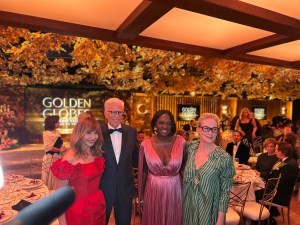Those actors scurrying around at the festival in Palm Springs would have been better served witnessing masterclasses in artistry from Viola Davis and Ted Danson, the recipients of Golden Globes honors on Friday night.
Not only that, there was Mary Steenburgen and Meryl Streep, too.
And Carol Burnett and Jane Fonda!

(L-R) Mary Steenburgen, Ted Danson, Viola Davis and Meryl Streep in the Wilshire Garden at the Beverly Hilton
Baz Bamigboye/Deadline
Streep spoke of her first meeting with Davis. It was when the two women met at the table read for the screen version of John Patrick Shanley’s Pulitzer Prize-winning play Doubt.
Streep admitted that that she’d been a little out of sorts because playwright Tony Kushner had hailed Davis as his “favorite actor in the whole world.”
But then Streep sat opposite Davis at the read-through, with Amy Adams and the late Philip Seymour Hoffman, and saw exactly what Kushner had meant. “She sat there, so still, like a quiet volcano just pretending to be a hill… she’s getting ready underneath,” she told the gathering at the Beverly Hilton event hosted by Golden Globes president Helen Hoehne.
Streep noted that it was Davis’ eight-minute soliloquy in Doubt “that brought us here today, that launched an already storied career.”
“Yeah, we all met Viola Davis that day,” Streep cried.
“From that day I became a member, just like you, of the astonished audience thats witnessed everything she’s given us since then. … Viola takes us to church. She has picked through the shattered glass and blood-colored shards of a painful childhood and reassembled it into a stained glass window,” Streep said.
Looking directly at Davis, who sat surrounded by family and friends, including husband Julius Tennon and daughter Genesis, Streep told her that “you have earned your crown,” adding “you are a very complex woman and a pure artist, she just delivers the truth very time. We are in awe of you my beautiful friend, and we are grateful.”
Davis returned the compliment, “Thank you Meryl, you’re such a great broad.”
After which, she admitted following Streep into the bathroom during that read-through, “just so I could smell Meryl Streep.”

Meryl Streep and Viola Davis
Christopher Polk/Penske Media via Getty Images

(L-R) Jane Fonda, Carol Burnett, Ted Danson and Mary Steenburgen
Michael Buckner/Penske Media via Getty Images
Then something extraordinary happened. Right before our eyes, Davis transformed. Her physicality shape-shifted and she became a combination of every August Wilson character she’d played, there was Mother Courage in there too, some Ibsen, a Shakespearean tragedian, and then she began.
“This is my testimony … I think I decided to be an actor because acting was part of a much higher journey.
“I was born into a life that just did not make sense. I was born into abject poverty. I was mischievous, I was imaginative, I was rambunctious but I was so poor … born up in a house with alcoholism and rage, infested with rats, toilets that didn’t work. I was a bedwetter and went to school with the same clothes soaked with urine. I just wanted to be somebody. “
What she had, she recounted, was magic. “I was curious, and you know what my magic was? That I could teleport, that I can take myself out of this worthless world and relieve myself of it at times. I could go to a place where I could belly laugh, where I could have fun. And the biggest magic was, I could see people. I could see that woman at the corner standing there in freezing cold weather with dirty hair and really bad acne, smoking a cigarette with blood-shot eyes… nobody gave a s— about people like that but she was my Mona Lisa… I would go, ‘who are you?’”
It was that curiosity, that search for honesty that allowed her to burrow underneath to discover a character. I remember being in New York and John Barlow, who was then a Broadway theatre publicist, telling me to haul myself over to the Virginia Theatre [since renamed the August Wilson] to see Wilson’s play King Hedley II with Brian Stokes Mitchell and Leslie Uggams, but to watch out for a thespian by the name of Viola Davis. The production was short-lived, but Davis won the Tony Award for Best Featured Actress In A Play.
I made darn sure that I saw everything she did thereafter. My only sadness is that UK audiences have not had the opportunity to witness her on stage. Yes, she’s magic on screen, but in person, live in the flesh on a stage, she is electrifying, just as she was Friday night when Streep awarded her the Golden Globes Cecil B. DeMille prize.
Equally, to hear Mary Steenburgen describe how, growing up, she had imagined a Barbie dream date board game to find her perfect match. The Kens didn’t interest her. She dreamt instead of Tom, who became, she said during an hilarious presentation, Ted — Ted Danson.
Steenburgen was at the ceremony to honor her husband with the Carol Burnett Award, and it was fitting that Burnett was sitting at the same table as Danson and Steenburgen.
I was living in New York when Cheers began its initial 11-year run, and I attended more than one Cheers party; more than I can recall.
Danson joked that his three-month-old grandson was “upstairs” watching reruns of Cheers. He also praised the writers and cast members of Cheers. “I wouldn’t be standing here if it wasn’t for Cheers,” he said.
Danson’s still at it over four decades later with Netflix comedy A Man on the Inside, which has been renewed for a second season. It was right and proper that Netflix CEO Ted Sarandos be in the room to help celebrate Danson.
Sarandos observed that comedy “is the hardest” to get right and that Danson has discovered the right combination.
It was so utterly charming that so many members of Danson’s family were in attendance, as were so many of the writers and crew that he’d worked with over the years.
For me, two of the attendees absolutely personified class.
In an era where the shenanigans involving publicists, and heaven only knows who else, who represent Blake Lively and Justin Baldoni, have reached beyond the gutter, and show only the shoddy side of Hollywood, it was a pleasure to catch up with Annett Wolf, who has represented Danson for four decades, and Lisa Kasteler, one-time partners in Wolf-Kasteler Public Relations.

(L-R) Lisa Kasteler and Annett Wolf on Friday night
Baz Bamigboye/Deadline
Actually, Kasteler arranged my first interview with Davis, and I think Jonathan Rutter, the London legend, was the middleman.
Seeing Wolf, Kasteler and their colleagues Friday night reassured me that class wins over whatever the heck’s going on in the Lively and Baldoni cesspit.
The Golden Globes night of excellence was the first year that the special awards had been separated from the main show, which is on Sunday. I was initially conflicted, feeling that the special honors had been shunted off well away from the festivities of the big event.
But Friday night allowed the honorees to discuss their art at length, without folk racing off to the smoking joint in a back room of the ballroom at the Beverly Hilton, which is what usually happens during the presentations of special awards!
My sense, however, is that many others could well have benefited from being there to see such giants being feted by their peers and loved ones.







